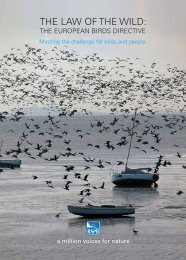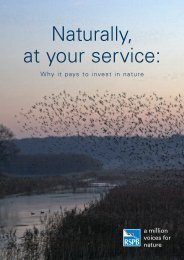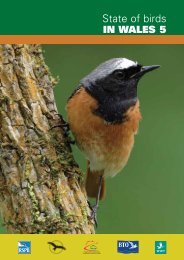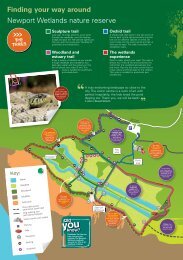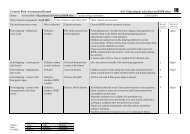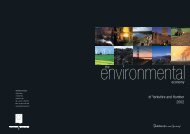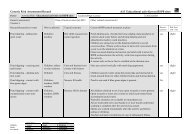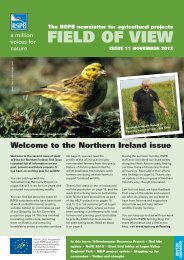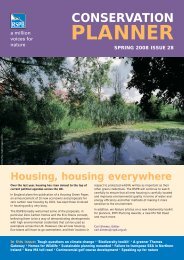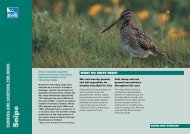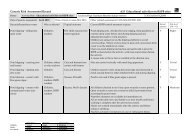Conservation Science in the RSPB 2006
Conservation Science in the RSPB 2006
Conservation Science in the RSPB 2006
You also want an ePaper? Increase the reach of your titles
YUMPU automatically turns print PDFs into web optimized ePapers that Google loves.
30<br />
Andy Hay (rspb-images.com)<br />
Install<strong>in</strong>g bearded tit ‘nestboxes’ at Leighton Moss<br />
The autumn of 2000 was <strong>the</strong><br />
wettest <strong>in</strong> England and Wales s<strong>in</strong>ce<br />
records began <strong>in</strong> 1766 and <strong>the</strong><br />
reedbed at Leighton Moss was<br />
flooded for most of November and<br />
December. At this time of year,<br />
bearded tits feed ma<strong>in</strong>ly on reed<br />
seeds, which at Leighton Moss <strong>the</strong>y<br />
ga<strong>the</strong>r ma<strong>in</strong>ly from <strong>the</strong> reed litter on<br />
<strong>the</strong> ground. With most of this litter<br />
under water, <strong>the</strong> bearded tits lost<br />
<strong>the</strong>ir ma<strong>in</strong> food source and body<br />
weights were low. The flood waters<br />
receded dur<strong>in</strong>g late December but<br />
were followed immediately by 10<br />
days of cold wea<strong>the</strong>r, but not of <strong>the</strong><br />
severity known to have caused<br />
previous population decl<strong>in</strong>es.<br />
A survey <strong>in</strong> 2001 revealed just seven<br />
active nests, a decl<strong>in</strong>e of 90% on <strong>the</strong><br />
year before. Recaptures of r<strong>in</strong>ged<br />
birds <strong>in</strong>dicated that fewer than 5% of<br />
bearded tits survived <strong>the</strong> 2000–2001<br />
w<strong>in</strong>ter, compared to 56% of adults<br />
and 40% of first-years that survived<br />
o<strong>the</strong>r w<strong>in</strong>ters.<br />
The impact of this flood was severe,<br />
caus<strong>in</strong>g <strong>the</strong> birds to die ei<strong>the</strong>r through<br />
lack of food or by be<strong>in</strong>g <strong>in</strong> such poor<br />
condition that <strong>the</strong>y were unable to<br />
survive dur<strong>in</strong>g <strong>the</strong> subsequent cold<br />
wea<strong>the</strong>r. Climate change is<br />
expected to br<strong>in</strong>g wetter autumns<br />
and w<strong>in</strong>ters to north-western Europe<br />
and flood<strong>in</strong>g of reedbeds could pose<br />
an <strong>in</strong>creas<strong>in</strong>g threat to bearded<br />
tit populations.<br />
Contact:<br />
will.peach@rspb.org.uk<br />
Wilson J and Peach W (<strong>in</strong> press) Impact of<br />
exceptional w<strong>in</strong>ter flood<strong>in</strong>g on <strong>the</strong> population<br />
dynamics of bearded tits Panurus biarmicus.<br />
Animal <strong>Conservation</strong>.<br />
doi: 10.1111/j.1469-1795.<strong>2006</strong>.00063.x






